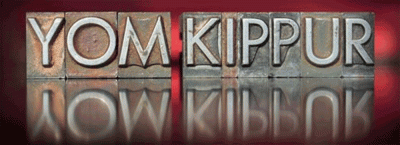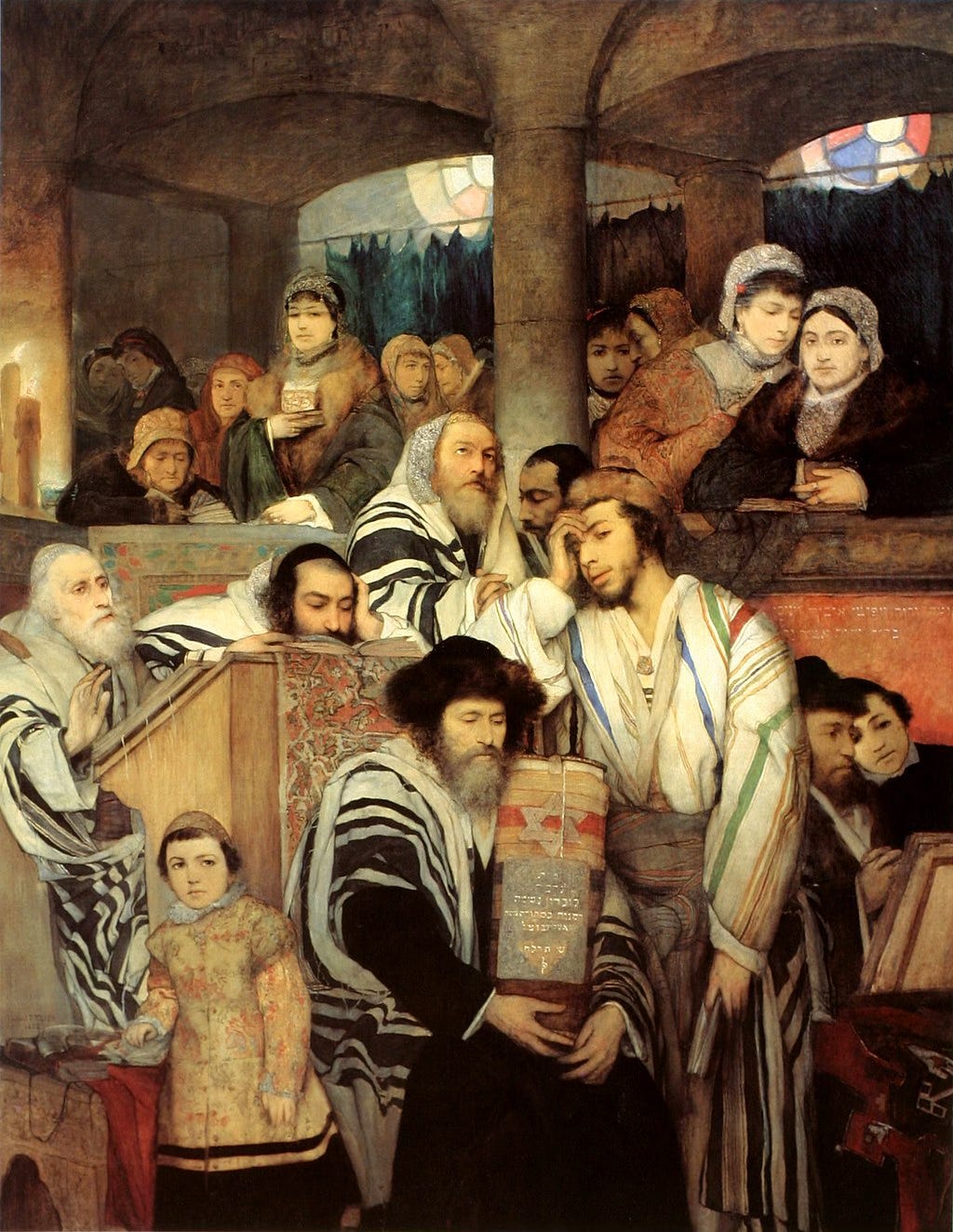Yom Kippur: Repent Before a Big Trumpet Blast!
“Behold, now is the accepted time; behold, now is the day of salvation.” (2 Corinthians 6:2)
As if Israel didn’t have enough trouble, with war on many fronts, this is the most solemn day on the Jewish calendar: the Day of Atonement, Yom Kippur.
It is a rehearsal for Judgment Day.
Yom means “day” and Kippur comes from a root that means “to atone,” related to the covering of the Ark (the kapporet).
The Jewish people will fast beginning at sunset this Friday evening October 11 until sunset on Shabbat October 12. Since it is forbidden to fast on Shabbat, what happens when Yom Kippur occurs on Shabbat? All other fast days are postponed until Sunday when they fall on Shabbat. However, unlike all other fasts, Yom Kippur is not postponed, and is fully observed even on Shabbat. The Torah dubs Yom Kippur Shabbat Shabbaton—the “Shabbat of Shabbats,” implying that it takes precedence over the sacred weekly holiday of Shabbat.
Yom Kippur is a complete Sabbath; no work can be performed. Many of my secular Jewish and Israeli friends do not consider themselves to be religious; nevertheless they honor this day in some way, by abstaining from work, by fasting for 25 hours or attending synagogue services. All Jews collectively know that Yom Kippur is a day to “afflict the soul” according to Leviticus 23: 27. Ideally, the fast is a complete fast, without food or water, but exceptions are made for the elderly, infirm and pregnant women.
The Jewish people believe that on this day God enters his verdict in books which are sealed. According to “Judaism 101,” today is your last chance to change a verdict, to demonstrate your repentance and to make amends.
In the synagogues the cantors sing the Kol Nidrei ( “All vows”), a fascinating disclaimer, with its touching melodic phrases:
“All personal vows we are likely to make, all personal oaths and pledges we are likely to take between this Yom Kippur and the next Yom Kippur, we publicly renounce. . . . Let our personal vows, pledges and oaths be considered neither vows nor pledges nor oaths.”
The leader and the congregation say together three times, “May all the people of Israel be forgiven, including all the strangers who live in their midst, for all the people are in fault.” This is corporate prayer–holy activity that many evangelical churches need to learn more about when seeking God’s favour and forgiveness for our increasingly disturbing and great national sins.
Following the atrocities of 7 October 2023, a new hunger has emerged amongst those who have been preparing for Yom Kippur. What other nation shuts down to honor God like this? As watchmen on the walls, we honor our Jewish brethren on Yom Kippur because we know they are seeking God fervently. They believe Messiah is yet to come; we believe He has already come– but that He is coming again to save all of Israel! The streets will be empty of traffic and filled instead with Jewish men, women, and children wearing white garments in solemn observance of this special occasion.
Passover is about personal salvation; Yom Kippur is about national salvation. Yom Kippur was the original “National Day of Prayer.” In the Book of Leviticus, it is written as Yom Kippurim (plural) for it is a day of corporate salvation and points to the time when “all of Israel shall be saved.”
I describe myself as a Judeo-Christian. Without my Hebraic roots, Christianity cannot be explained or understood. Jesus/Yeshua is now our High Priest, accessible to us every day, not just on one holy day. Through Him, we can come boldly before the throne of grace (Hebrews 4:16), knowing we will receive mercy and help in our time of need.
The Cross is history’s centrepiece. Followers of Rabbi Jesus/Yeshua believe He died to make Atonement as God’s sacrificial Lamb upon the altar of the Cross at Passover. We choose to look by faith to the judgment of our sin on his Cross for all time and eternity. When we look at the Cross, as Moses lifted the brazen serpent in the wilderness, we live, and our sins are forgiven vicariously. Every Yom Kippur I am especially grateful that the Lord made Atonement for me. Therefore, happily, I do not need to attempt to trust in my own insufficient righteousness!
The Jewish people have a saying for this day, “May your name be inscribed favorably in the Book of Life.” Born-again Christians are eternally grateful to our Jewish Saviour: because of the merit of his finished work on the Cross, our names are indeed inscribed and sealed in the Lamb’s Book of Life–when we put our faith in Him. Thank God, as long as the Gospel door of hope is open, a peron’s name can still be written in the Lamb’s Book of Life whenever he or she repents and believes the Good News! (Luke 10: 20; Revelation 3: 5; 13: 8; 20: 12)
Live repentance prayers
It is interesting that the Jewish people believe that on this day only sins against God are dealt with, not sins against another person. The rabbis teach that reconciliation with other individuals must be done before Yom Kippur.
Today there will be a stillness in the streets of Israel unlike any other nation experiences. No other nation engages in a total fast annually, humbling themselves before God in deep national and individual repentance. The Almighty will pour out the spirit of grace and supplication as prophesied in Zechariah 12:10. Amen!
As Yom Kippur ends, there will be a long shofar blast in synagogues. Ten days ago, Yom Teruah, the “day of alarm/shouting,” is also called the Feast of Trumpets. The shofar was sounded 100 times during a traditional Feast of Trumpets/Rosh Hashanah service. Now a long and loud shofar blast will mark the end of the fast day of Yom Kippur.
The following illustration is from The Temple Institute in Jerusalem:
The rabbis call this the Closing of the Gates. It is awesome to me that in Judaism Yom Kippur is the day of the last call to repent before a big trumpet blast! The concept definitely transferred into Christianity– 2 Corinthians 6:2 declares: “Today IS the day of salvation.” Today IS the day of the last call. Why? God never promises us tomorrow.
“Today, if you hear his voice, do not harden your hearts as you did in the rebellion.“ (Hebrews 3: 15)
Photo courtesy of photographer Alex Kolomoisky’s Facebook page
Yom Kippur can therefore possibly be a foreshadowing of the Rapture.
1 Thessalonians 4: 16-17 teaches that the trumpet shall sound, the dead in Messiah shall be raised and those of us who are alive and remain will be caught up with them in the clouds to meet the Lord in the atmosphere.
The text of Leviticus 23: 24 concerning what we call the “Feast of Trumpets,” in fact, is Yom Teruah תְּרוּעָ֖ה. Teruah is the festal shout. Therefore the Feast of Trumpets is literally Yom Teruah=Day of Shouting, interpreted to mean blast of trumpets but the shofar is not specifically mentioned.
However, on the other hand Leviticus 25: 9 is very specific about trumpets associated with Yom Kippur during the Year of Jubilee: “Then have the trumpet sounded everywhere on the tenth day of the seventh month; on the Day of Atonement sound the trumpet throughout your land.”
Furthermore, the service at the end of Yom Kippur is often called THE CLOSING OF THE GATES!
Soon the gates of mercy will close, my friend, just as God Himself closed the door of Noah’s ark, and only those who were shut inside were saved. Jesus is our ark of eternal security. We are living in an extended period of grace. All who call upon the Lord SHALL be saved!
Does it matter that Christians observe Yom Kippur? As stated so beautifully by John Parsons at Hebrew for Christians,
Since prophetically speaking Yom Kippur signifies ethic Israel’s atonement secured through Yeshua’s sacrificial avodah [work] as Israel’s true High Priest and King, there is still a sense of longing and affliction connected to this holiday that will not be removed until finally “all Israel is saved” (Rom. 11: 26). So, on the one hand we celebrate Yom Kippur because it acknowledges Yeshua as our High Priest of the New Covenant, but on the other hand, we “have great sorrow and unceasing anguish in our hearts” for the redemption of the Jewish people and the atonement of their sins (Rom. 9:1-5; 10:1-4; 11:1-2, 11-15, 25-27). In the meantime, we are in a period of “mysterious grace” wherein we have opportunity to offer the terms of the New Covenant to people of every nation, tribe and tongue. After the “fullness of the Gentiles” is come in, however, God will turn His full attention to fulfilling His promises given to ethnic Israel. May that great Day of the LORD come soon, chaverim [friends]…
The judgment of God upon the USA, and indeed the world, has never been more apparent. For those with ears to hear: let us do teshuvah [repentance] and pray. The time is near!”











Thank you. I always learn so much from your messages and your understanding of the Jewish language. I agree how apparent the judgment of God is today calling us to repentance. It is truly a time of testing and cleaving to God and His Word. Blessings!
🙌🏼🩷🙏